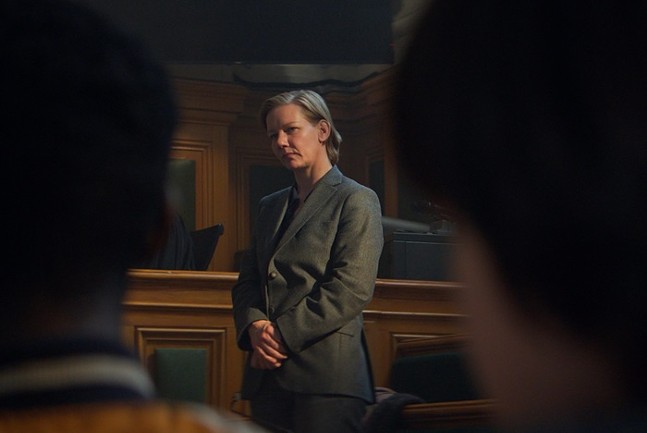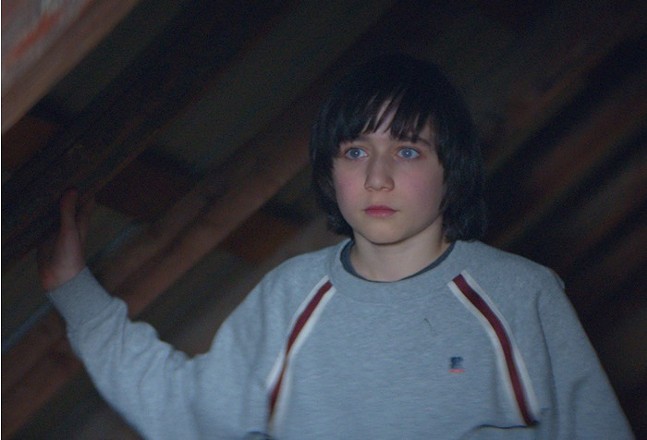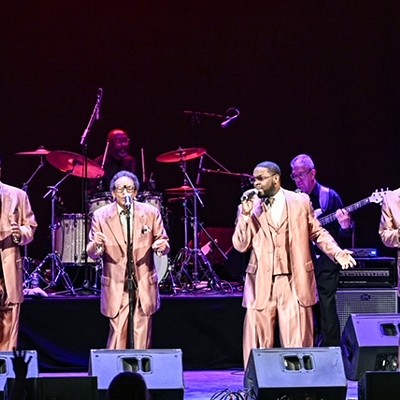Anatomy of a Fall delivers an endlessly gripping pseudo-murder mystery
The saying goes that when you’re deprived of one of your senses, your other ones become heightened to compensate. If a person has diminished eyesight, their auditory sense could be elevated enough to hear just about anything — unless, of course, an instrumental cover of 50 Cent’s “P.I.M.P” is blaring full-volume through their isolated French retreat, thus dulling the sound of their father's untimely death.
And so goes French film director Justine Triet’s Palme d’Or-winning film Anatomy of a Fall, an endlessly gripping pseudo-murder mystery with confusion and uncertainty becoming the center and lifeblood of the film. It often feels as though the characters exist in a courtroom diorama created to prove that murder is afoot.
The plot of Anatomy — set to screen from Mon., Nov. 20-Thu., Dec. 7 at the Harris Theater — is deceptively simple. Sandra (Sandra Hüller), an author of deeply personal novels, has moved to a remote house at the top of the mountain in France with her struggling writer husband Samuel (Samuel Maleski), their precocious, partially blind son Daniel (Milo Machado-Graner), and, most importantly, their service dog Snoop (a legitimately incredible dog actor named Messi). One day, Sandra goes down for a nap while Daniel and Snoop go out for a walk. They come back to Samuel, dead in the snow, the victim of a fall from the top of the building.
The rest of the film is litigation, in some ways conventional, in others far less so, all to surmise if Samuel jumped, or if Sandra pushed him. In that sense, the film is a meticulous crime drama. There is the suave and confident lawyer in the form of Vincent Renzi (Swann Arlaud), a man so comically, distractingly French in everything he does. There is the cocky prosecutor (Antoine Reinartz), who demonstrates to American audiences how differently French trials operate; the prosecutor bases most of his case on supposition, witnesses and the defendant can go back and forth with each other, and entire stretches of Sandra’s fictional books are read on the record. It’s chaos, but it makes for great theater.
The real core of the film, however, is what the trial and the film are asking — can we ever truly understand when we only have the moments of their life that they’ve revealed to us? This is where the forced perspective comes in, and where Trier has created something astonishing — everybody only knows their truth or their understanding of it. Daniel is the closest witness, and his vision literally can’t be trusted and his hearing was drowned out by music, perhaps intentionally. Samuel secretly recorded his and Sandra’s arguments, which, when introduced to the court, paint her as a coldhearted and manipulative monster. Being that he did so to draw inspiration for a new writing project, couldn’t he have been instigating fights for the sake of producing content? It’s not that nobody is what they seem in Anatomy, it’s that they’re only how they seem to themselves.
If this all sounds high-minded, fear not, as the film’s substantial running time passes in a blur. Trier’s economical direction and adept storytelling keep the film at a propulsive pace, and there are enough twists and knockout individual scenes that you’re never bored (one flashback to an argument between Sandra and Samuel is one of the more soul-crushing moments in its commitment to the rhythms and jabs only known to people who have been together for a long time).
But much of the credit goes to the performances, which buoy a fun and interesting procedural into one of the best films of the year. There’s a whole laundry list of great supporting turns here, from Reinartz’s smarmy and cutting prosecutor to Machado-Graner’s all-timer of a child performance filled with nuance and the hurt that comes with internalizing a thousand arguments that are at least partially about you. However, the film rides and dies with Hüller, and she delivers at every turn. Every beat from her is note-perfect, with something going behind her eyes at any given moment. She’s just innocent enough to cast doubt on her guilt and just guilty enough to question her innocence.
In such a mesmerizing performance of ambiguity, the only place Anatomy falls short is its ending, which robs viewers of the chance to analyze what they’ve seen for themselves in a case where it never feels like a definitive answer is even possible. It lacks the emotional gut punch a film of this caliber deserves, but not enough to rob it of being one of the year’s best.
Anatomy of a Fall. Mon., Nov. 20-Thu., Dec. 7. Harris Theater. 809 Liberty Ave., Downtown. $11. trustarts.org
And so goes French film director Justine Triet’s Palme d’Or-winning film Anatomy of a Fall, an endlessly gripping pseudo-murder mystery with confusion and uncertainty becoming the center and lifeblood of the film. It often feels as though the characters exist in a courtroom diorama created to prove that murder is afoot.
The plot of Anatomy — set to screen from Mon., Nov. 20-Thu., Dec. 7 at the Harris Theater — is deceptively simple. Sandra (Sandra Hüller), an author of deeply personal novels, has moved to a remote house at the top of the mountain in France with her struggling writer husband Samuel (Samuel Maleski), their precocious, partially blind son Daniel (Milo Machado-Graner), and, most importantly, their service dog Snoop (a legitimately incredible dog actor named Messi). One day, Sandra goes down for a nap while Daniel and Snoop go out for a walk. They come back to Samuel, dead in the snow, the victim of a fall from the top of the building.
The rest of the film is litigation, in some ways conventional, in others far less so, all to surmise if Samuel jumped, or if Sandra pushed him. In that sense, the film is a meticulous crime drama. There is the suave and confident lawyer in the form of Vincent Renzi (Swann Arlaud), a man so comically, distractingly French in everything he does. There is the cocky prosecutor (Antoine Reinartz), who demonstrates to American audiences how differently French trials operate; the prosecutor bases most of his case on supposition, witnesses and the defendant can go back and forth with each other, and entire stretches of Sandra’s fictional books are read on the record. It’s chaos, but it makes for great theater.
The real core of the film, however, is what the trial and the film are asking — can we ever truly understand when we only have the moments of their life that they’ve revealed to us? This is where the forced perspective comes in, and where Trier has created something astonishing — everybody only knows their truth or their understanding of it. Daniel is the closest witness, and his vision literally can’t be trusted and his hearing was drowned out by music, perhaps intentionally. Samuel secretly recorded his and Sandra’s arguments, which, when introduced to the court, paint her as a coldhearted and manipulative monster. Being that he did so to draw inspiration for a new writing project, couldn’t he have been instigating fights for the sake of producing content? It’s not that nobody is what they seem in Anatomy, it’s that they’re only how they seem to themselves.
If this all sounds high-minded, fear not, as the film’s substantial running time passes in a blur. Trier’s economical direction and adept storytelling keep the film at a propulsive pace, and there are enough twists and knockout individual scenes that you’re never bored (one flashback to an argument between Sandra and Samuel is one of the more soul-crushing moments in its commitment to the rhythms and jabs only known to people who have been together for a long time).
But much of the credit goes to the performances, which buoy a fun and interesting procedural into one of the best films of the year. There’s a whole laundry list of great supporting turns here, from Reinartz’s smarmy and cutting prosecutor to Machado-Graner’s all-timer of a child performance filled with nuance and the hurt that comes with internalizing a thousand arguments that are at least partially about you. However, the film rides and dies with Hüller, and she delivers at every turn. Every beat from her is note-perfect, with something going behind her eyes at any given moment. She’s just innocent enough to cast doubt on her guilt and just guilty enough to question her innocence.
In such a mesmerizing performance of ambiguity, the only place Anatomy falls short is its ending, which robs viewers of the chance to analyze what they’ve seen for themselves in a case where it never feels like a definitive answer is even possible. It lacks the emotional gut punch a film of this caliber deserves, but not enough to rob it of being one of the year’s best.
Anatomy of a Fall. Mon., Nov. 20-Thu., Dec. 7. Harris Theater. 809 Liberty Ave., Downtown. $11. trustarts.org



















